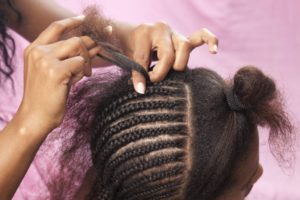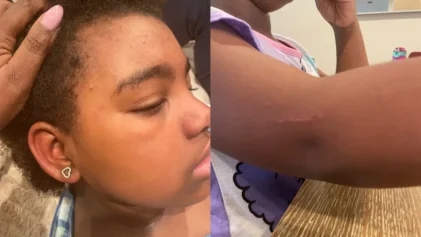
Under Indiana law, hair braiders were once required to have a cosmetology license in order to practice their craft. (Photo by Ruslan Dashinski/Getty Images)
Once tangled up by the state’s strict cosmetology laws, hair braiders in Indiana are now free to continue their practice without obtaining an occupational license.
On Sunday, Indiana became the 22nd state to exempt natural and African-style hair braiding from its cosmetology laws. The bill, authored by Rep. Timothy Wesco (R) and Sen. Liz Brown (R), passed by wide margins in the Indiana General Assembly, signaling a long-fought victory for hair braiders across the state.
“Indiana has long prided itself as ‘a state that works,'” said Lee McGrath, a Senior Legislative Counsel for the Institute for Justice. “… [House Bill 1243] proves that those words are more than a motto by repealing a completely arbitrary labor-market regulation that stops braiders from earning an honest living.”
Before the bill was signed into law by Gov. Eric Holcomb last week, hair braiders could only work if they had a cosmetology license, which required at least 1,500 hours of training and upward of $10,000. Braiding is different from traditional modes of cosmetology, however, as it does not use chemicals like dyes or relaxers. Moreover, most cosmetology schools don’t teach natural hair braiding, as the technique is largely one that’s been passed down from mother to daughter or other family members.
Wesco described the regulation as one meant to thwart entrepreneurship, saying, “this is a perfect example of a regulation we don’t need.”
The law proved to be problematic for hair braiders like Nicole Barnes-Thomas, who was forced to close her salon. Many braiders were backed into a corner and forced to either give up their craft, shell out $20,000 (or more) for beauty school tuition to complete the mandated 1,500 hours of training or risk getting caught operating their salons without a license. Those caught doing so risked committing a misdemeanor, which is punishable by a maximum fine of $500, according to the Indianapolis Star.
“Indiana should not require a license for something as safe and common as braiding,” Barnes-Thomas said. “I am proud that this bill passed and look forward to being able to get back to work as a braider.”
Similar legislation exempting hair braiders from occupational licensing has been introduced in several states this year, including Louisiana, New Jersey and Missouri. Last July, two Black women successfully challenged Iowa’s cosmetology laws in court.


